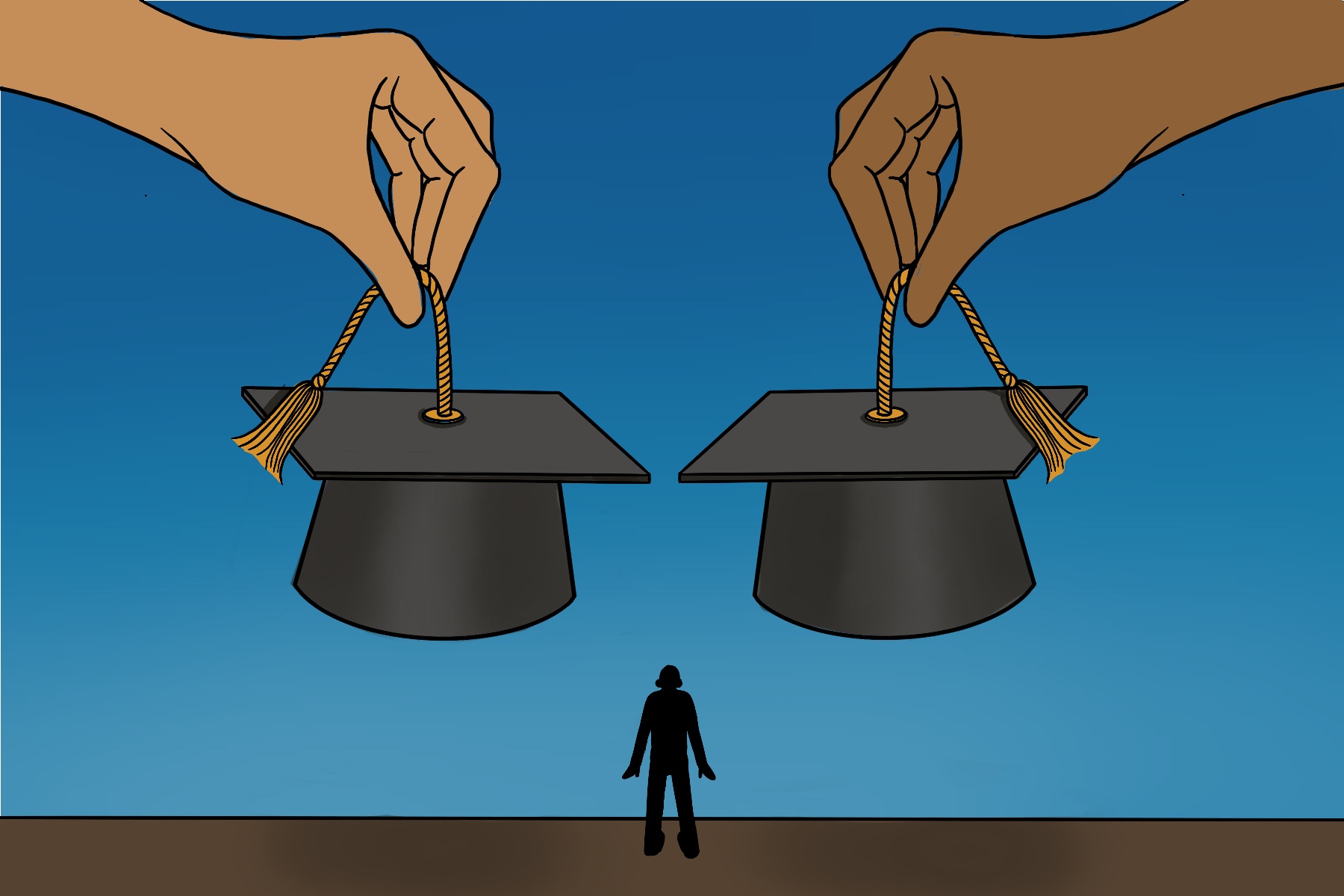Every country has its own educational system: In Finland, students are only given half an hour’s worth of schoolwork each night; in contrast, South Korean students are in school for 14 to 16 hours each day. No matter how distinct most school systems around the world might be, many have one common denominator; institutions in many, but not all, countries are categorized into two categories: public and private.
Some believe that private school education is inherently more prestigious and challenging than public schools, while others believe that public schools are just as reputable as their private counterparts. So which one is actually the best choice? The elusive answer to this question has been a mystery as long as this question existed.
Dramatic introductions aside, I am not bashing on anyone who attends either of these types of educational systems. I am just sharing my observations and experiences as an attendee of both. I currently attend the University of Southern California (USC), which is a private university in downtown Los Angeles. Before that, I was enrolled in a public university within the University of California college system: UC Irvine located in Irvine, California. Two very distinct schools but with just about the same reputation within the state, although UK assignment help could assist with both.
To be perfectly clear, I am not speaking for all private and public universities in this country but just what I was able to deduce as a student from both types of school systems, specifically in California. And here is what I found:
Tuition
The sole difference between private and public schools is how it is funded. Public schools receive the majority of their funding through the state government, whereas private institutions rely heavily on tuition and donations as their main source of income. That is the reason why tuitions at private institutions are inherently more expensive than public state schools.
Depending on the school, each semester at a public university will probably cost around $10,000 to $20,000. According to the College Board, the average cost of attendance at public universities for in-state students in 2018-19 is $21,370, including tuition, fees and housing. For out-of-state students, the average price for attending a public school is $37,430. Compared to a year’s tuition at a private university, it can cost $48,510 on average. At a private school, both in-state and out-of-state students pay the same amount of tuition. These are still big price tags for higher education.
When I was attending a public university, I found that my federal aid disbursement was able to cover the majority, if not the entirety, of my tuition, not including room, board and dissertation writing services. I cannot verify if this is true, but it’s a personal observation from my own disbursement that I found.
Also, it is important to note that just because someone pays more for their education, that doesn’t make their degree worth more. According to U.S News 2020 Best University Ranking, public institutions such as UC Berkeley, UCLA and University of Virginia all made the top 50 rankings. These are prestigious public universities just as much as any private universities on the list.
Class Size
The student population at public universities is much bigger than private. For example, the University of Central Florida accommodates around 56,972. This is the largest university in America according to undergraduate enrollment in 2017. At a public university, it is common to have more than 100 students in lectures. These types of classes are not as common at a private university.
It is much harder for students to stand out in a lecture class with over 100 students. The only time to make connections is by attending office hours. Class sizes in a private institution are much smaller, which allows students to have more opportunities for one-on-one time with the professor. This is a perk in a private university.
At USC, class sizes range from 10 students to 60 students, but I have yet to encounter a class with over 100 students. However, since the student population and class sizes are smaller, there is more competition among peers who need to take the same classes. Due to the smaller class size, slots are limited for requirement classes, and competition becomes fierce.
For public schools, since the class size is so big, the variety of classes and time slots offered are much more diverse. A larger student body allows the institution to explore and experiment with different course topics. In the spring of 2019, UC Berkeley offered a class called “Next Generation Leaders: BTS,” where students will scrutinize the rising phenomenon of the South Korean Kpop sensation. There is more freedom to seek out classes you want at your university whereas private schools offer a more limited number of fun classes.
Diversity and Campus Life
While pubic universities actively admit students from out of state to boost its diverse population, those students are still reluctant about paying the out-of-state tuition unless the public school reputation exceeds it. Therefore, public universities’ demographics often reflect its own state demographic. At private universities, however, admissions have more flexibility in crafting the class that matches the school’s priorities, according to Jodi Walder-Biesanz, an independent education consultant with College Admission Coach LLC.
So Which Is Better?
After weighing all the pros and cons, the ultimate conclusion is that it all depends on you. Everyone is different, and every student learns differently. I know this is such an anti-climatic ending, but I can only speak for myself and share my personal experience on this matter.
As for someone who attended a public institution and is now currently enrolled in a private college, I genuinely liked my experiences at my public university better.
At Irvine, I felt more at comfortable because the location and campus community fit my personality better than USC. Irvine is a residential, suburban area whereas USC is at the heart of downtown. I felt more at home at Irvine because I grew up in the suburbs and thus felt more comfortable in that environment.
However, UCI was not able to offer me an educational program that I was able to pursue. USC was able to check this important box for me. USC was able to provide me with a passionate environment that allowed me to grow as both a student and a professional. Even though I am not a city person and dislike the hustle and bustle of city life, I ultimately felt that USC could give me so much more than UCI.
Nonetheless, I still consider UCI a better college experience because it gave me my USC experience. Without going to UCI, I would not have met my lifelong friends. I would not have known what I wanted to do. I am so thankful and blessed to have had the chance to see both worlds and would not have it any other way.
















